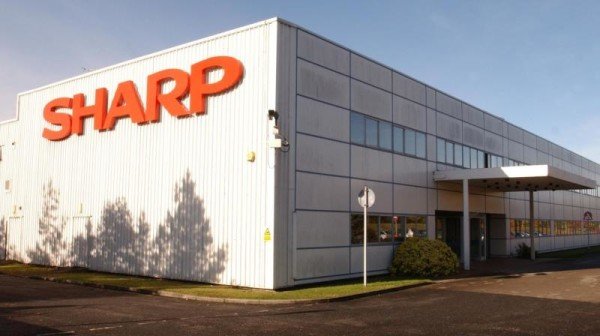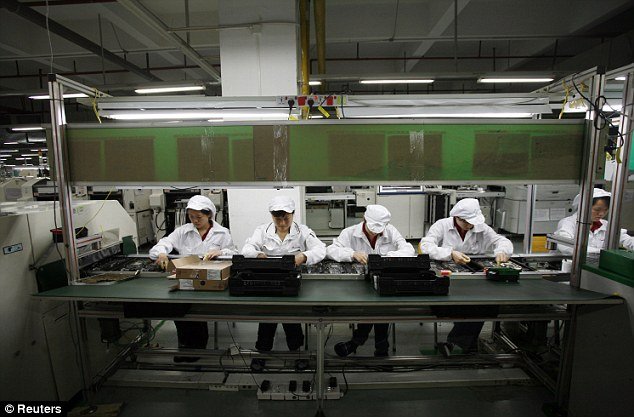Home Tags Posts tagged with "foxconn"
foxconn
Sharp’s shares lost 11% in Tokyo amid reports that the delay in its takeover by Taiwanese manufacturer Foxconn was due to previously undisclosed losses.
The Japanese tech giant announced the $4.3 billion deal on February 25.
However, Foxconn later said it would not sign the deal until it clarified “new information” Sharp had provided, without giving any specifics.
Foxconn, also known as Hon Hai, assembles most of the world’s iPhones.
Several unconfirmed reports quoting unnamed sources have emerged saying that the “new information” provided at the last minute had to do with huge losses on Sharp’s balance sheet.
Reuters quoted sources as saying the liabilities amounted to “hundreds of billions of yen”, while the Nikkei Asian Review put the figure at 350 billion yen ($3.1 billion).
Nikkei said Sharp had sent Foxconn documents listing the details of these losses, including severance pay, breach-of-contract penalties, and repayments of government funds.
However, Bloomberg reported that the liabilities could also end up being much lower if not all of them are incurred.
Sharp is one of Japan’s oldest tech companies, but it has been saddled with heavy debts and has faced two big bailouts in recent years. In 2012 it came close to bankruptcy.
It was founded in 1912 and has pioneered developments in television engineering.
Japanese officials had been reluctant to let Sharp be taken over by a foreign company, particularly because of its breakthroughs in display panel technology.
Sharp has accepted a $4.3 billion takeover bid by Taiwanese multinational Foxconn.
The announcement came as Sharp’s board completed a two-day meeting to discuss competing takeover offers.
Foxconn assembles most of the world’s iPhones. Sharp is one of Japan’s oldest technology companies.
It is the first foreign takeover of a major Japanese electronics firm in a historically insular technology sector.
Japanese officials had been reluctant to let Sharp fall under foreign ownership because of the distinctive technology behind its display panels.
Founded in 1912, innovations by Sharp include a mechanical pencil in 1915 and pioneering developments in TV engineering.
Although recent years have seen a downturn in Sharp’s fortunes with heavy debts, the company continued to be a leader in liquid display technology, a key asset for Foxconn.
Shares in Sharp, which employs more than 50,000 globally, will be issued to Hon Hai Precision Industry Company, also known as Foxconn Technology Group.
Sharp’s shares were halted from trading ahead the announcement. They later reopened and closed down by nearly 15%.
Earlier this month, as it was considering several takeover offers, Sharp posted a bigger-than-expected net loss of $918 million for the April-to-December 2015 period.
In 2012, Sharp came close to entering bankruptcy. It has struggled with heavy debts and has been through two major bailouts in the last four years.
Foxconn first offered to invest in Sharp in 2012, but talks collapsed.
The US Fair Labor Association investigation has found “significant issues” among working practices at Chinese plants making Apple iPhones and iPads.
FLA was asked by Apple to investigate working conditions at Foxconn after reports of long hours and poor safety.
The association says it has now secured agreements to reduce hours, protect pay, and improve staff representation.
Apple said it “fully accepted” the report’s recommendations.
“We share the FLA’s goal of improving lives and raising the bar for manufacturing companies everywhere,” the giant tech company said in a statement.
The findings emerged as Apple CEO Tim Cook visited Foxconn facilities.
Tim Cook toured Zhengzhou Technology Park, where 120,000 employees work, on Wednesday.
A string of suicides at Foxconn last year put the spotlight on working conditions at its factories. Last month, the company announced it was to send independent inspectors from the FLA to audit the facilities.
The investigation – one of the largest ever conducted of a US company’s operations abroad – found employees often worked more than 60 hours a week and sometimes for seven days running without the required day off.

FLA investigation found that Foxconn employees often worked more than 60 hours a week and sometimes for seven days running without the required day off
Other violations included unpaid overtime and health and safety risks.
Average monthly salaries at the three factories ranged from $360 to $455. Foxconn raised salaries by up to 25% recently.
The FLA said Foxconn had agreed to comply with the association’s standards on working hours by July 2013, bringing them in line with a legal limit in China of 49 hours per week.
Apple will hire thousands more workers in order to compensate for the move, Reuters reports.
The report has been much anticipated as embodying a new and transparent approach to an old problem: that of cheap but popular consumer goods manufactured in poor conditions in developing countries.
However a telling line in the report is the one which notes that the Foxconn workers did not have true trade union representation.
The authorities in China are very wary of unions and are likely to remain so.
Before the report was released, labor unions expressed doubts that Apple was committed to improving standards.
“The report will include new promises by Apple that stand to be just as empty as the ones made over the past 5 years,” SumOfUS.org, a coalition of trade unions and consumer groups, said.
Foxconn employs 1.2 million workers in China to produce products for Apple as well as Microsoft, Hewlett-Packard, and other companies.
Some of the employees at Apple’s manufacturing centres in China complain about working excessive overtime without a single day off during the week, living together in crowded dormitories and standing so long that their legs swell and they can hardly walk after a 24-hour shift.
Almost 140 workers at a supplier in China were injured two years ago using a poisonous chemical to clean iPhone screens – and two explosions last year killed four people while injuring more than 75.
Apple had allegedly been alerted to hazardous conditions inside the Chengdu plant in southwest China before the explosions at those plants, reported the New York Times.
“If Apple was warned and didn’t act, that’s reprehensible,” Massachusetts Institute of Technology work safety expert Nicholas Ashford told the New York Times.
“But what’s morally repugnant in one country is accepted business practices in another, and companies take advantage of that,” the former U.S. Labor Department advisor added.
Banners in the Chengdu plant gave a warning to the 120,000 staff: “Work hard on the job today or work hard to find a job tomorrow.” Workers who arrived late often had to write confession letters.
The newspaper’s report comes hot on the heels of Apple announcing whopping $13 billion profits on $46 billion sales in its last quarter – but the firm still wants its overseas factories to produce more.
Apple executives claim it has improved factories in recent years and issues a supplier code of conduct on labour and safety – but problems still exist, according to employment advocacy groups.
More than half of the suppliers audited by Apple have broken at least one part of its conduct code each year since 2007 and have even broken the law in some cases, according to company reports.
A Foxconn employee jumped or fell from a block of flats after losing an iPhone prototype in 2009 – and 18 other workers apparently tried to commit suicide in two years, reported the New York Times.
Suicide nets were installed to prevent workers from jumping to their deaths and Foxconn began providing better mental health treatment for its staff.
Li Mingqi worked for Apple manufacturing partner Foxconn Technology until last spring and helped manage the Chengdu plant which had the explosion. He is now suing Foxconn over his dismissal.
“Apple never cared about anything other than increasing product quality and decreasing production cost,” Li Mingqi told the New York Times.
“Workers’ welfare has nothing to do with their interests.”
The fatal Chengdu explosion came from an aluminium dust build up three weeks after the iPad came out. Despite Apple’s probe, seven months on there was a further, non-fatal, explosion in Shanghai.

A former Apple executive claimed that the company has had knowledge of labour abuses in some factories for four years
A former Apple executive claimed that the company has had knowledge of labour abuses in some factories for four years – “and they’re still going on because the system works for us”.
Suppliers are only allowed the smallest margins on what they produce for Apple, and executives at the Cupertino company always ask them for details on part costs, worker numbers and salary sizes.
But workers at a factory of Apple partner Wintek went on strike after rumours that employees were exposed to toxins because they evaporated three times faster than alcohol when rubbing screens.
Apple’s late co-founder Steve Jobs, who died last October, said two years ago that the company is a worldwide leader in “understanding the working conditions in our supply chain”.
Steve Jobs said many of the factories have restaurants, cinemas, hospitals and swimming pools. While staff says they appreciate these facilities, the working conditions are still seen as relentless.
Foxconn said conditions are “anything but harsh”, just one in 20 workers assembly line workers must stand to do their jobs and the firm has a “very good safety record”, reported the New York Times.
The Mail on Sunday visited a Foxconn factory making iPods in Shenzhen, China, in 2006, and its reports on long hours, crowded accommodation and punishments shocked Apple executives.
“We’re trying really hard to make things better,” one former Apple executive told the New York Times.
“But most people would still be really disturbed if they saw where their iPhone comes from.”




